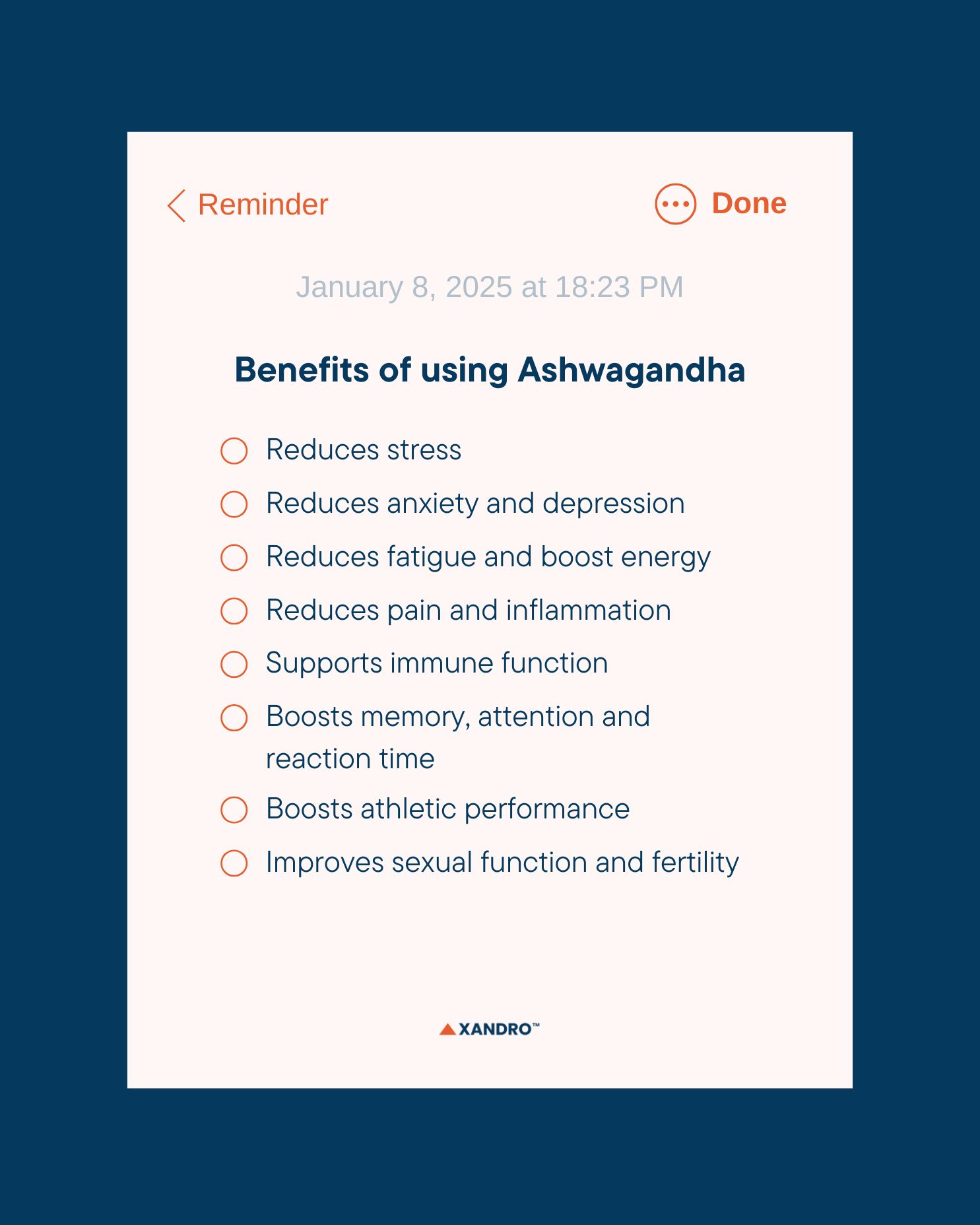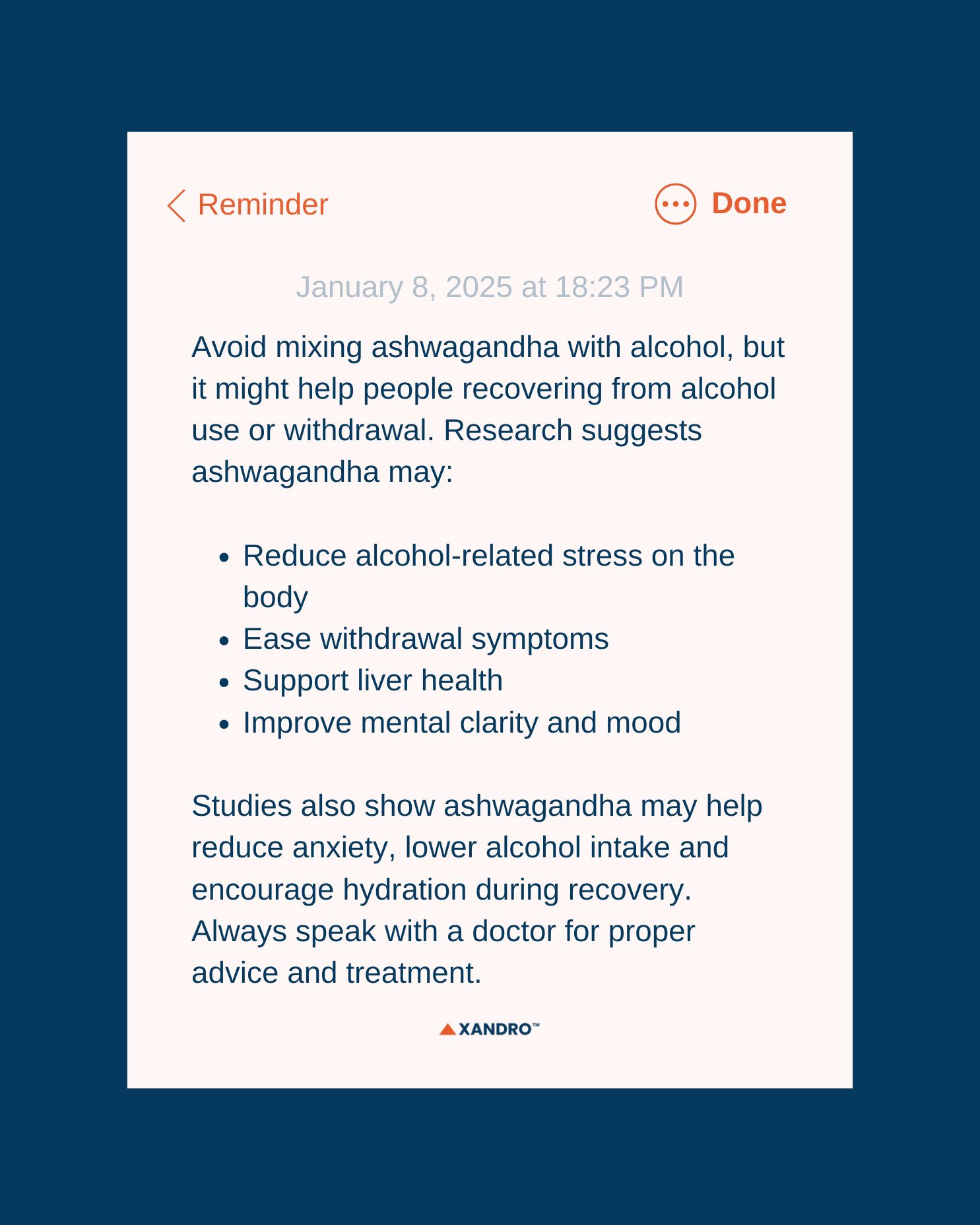Ashwagandha and Alcohol: Can You Mix Them Safely?
18th Jan 2025
Can You Safely Mix Ashwagandha and Alcohol? Here's What to Know!
Ashwagandha, a herb used in Ayurvedic medicine, is known for its stress-relieving and sleep-inducing properties. Alcohol, on the other hand, is a depressant often used for relaxation or social purposes.
Have you ever wondered, ‘Can you drink alcohol with ashwagandha?’ Let’s delve into the potential benefits, risks and practical considerations of mixing ashwagandha and alcohol.
Head there now:
- What Is Ashwagandha?
- Alcohol and Its Effects
- Can I Take Ashwagandha and Alcohol Together?
- Ashwagandha’s Role in Alcohol Recovery
- What Can You Not Take with Ashwagandha?
- Practical Tips for Safe Use
Ashwagandha, also called Withania somnifera, is a flowering shrub native to India and parts of Asia. Dubbed ‘Indian Ginseng,’ it has been used for centuries to:
- Reduce stress, anxiety and depression
- Improve sleep
- Reduce fatigue
- Boost energy levels
- Reduce pain and inflammation
- Support immune function
- Improve cognitive abilities, such as memory, reaction time and attention
- Boost athletic performance
- Improve sexual function and fertility
Modern research supports many of these claims, highlighting ashwagandha’s adaptogenic properties. Adaptogens help the body adapt to stress by regulating the hypothalamic-pituitary-adrenal (HPA) axis, which controls the body’s stress response.
Further Reading: Does Ashwagandha Boost Testosterone?

Alcohol is a central nervous system depressant. While moderate alcohol consumption can provide temporary relaxation, excessive or frequent use has long-term health risks.
Short-Term Effects of Alcohol:
- Impaired judgment and coordination
- Drowsiness
- Lowered inhibitions
- Risk of accidents or injuries
Long-Term Effects of Excessive Alcohol Use:
- Liver damage (e.g., cirrhosis, fatty liver)
- Heart problems (e.g., hypertension, stroke)
- Increased cancer risk
- Mental health issues (e.g., depression, anxiety)
- Dependence or addiction
Further Reading: Ashwagandha and Longevity
While both ashwagandha and alcohol can promote relaxation, their effects on the body differ significantly. Mixing ashwagandha and alcohol may pose risks and reduce the efficacy of ashwagandha.
Potential Risks:
- Increased Sedation: Both ashwagandha and alcohol can cause drowsiness. Ashwagandha increases the levels of GABA in the brain, a neurotransmitter that causes sedation, and since alcohol mimics GABA signalling, combined, they may amplify this effect, impairing coordination and increasing the risk of accidents.
- Reduced Effectiveness: Alcohol may counteract ashwagandha’s stress-reducing benefits by disrupting brain function and elevating cortisol levels.
- Individual Reactions: Responses to combining the two can vary based on factors like dosage, timing and individual health conditions.
One study looked at a woman who had liver problems after taking high doses of ashwagandha along with alcohol, but this is not to be taken as definite as she was also taking other supplements and painkillers and already had liver issues. For healthy, active people, drinking alcohol while using ashwagandha is unlikely to harm the liver.
Further Reading: The Difference Between Shoden®, Sensoril® and KSM-66 Ashwagandha
While the above-mentioned ashwagandha interactions with alcohol show that mixing the two should be avoided, interestingly, taking ashwagandha may have potential benefits for those recovering from alcohol consumption or withdrawal. Studies on ashwagandha and alcohol withdrawal suggest it could:
- Reduce oxidative stress caused by alcohol
- Alleviate withdrawal symptoms
- Support liver health
- Promote mental clarity and well-being
One study found that 500mg/kg of ashwagandha could be an alternative to using diazepam when going through alcohol withdrawal. Another study found that ashwagandha may help ease anxiety caused by alcohol withdrawal, help reduce the amount of alcohol consumed and help people drink more water.
Just keep in mind that these benefits are not a substitute for professional medical advice or treatment.
Further Reading: FAQs About Ashwagandha Part 1

Ashwagandha can affect the body in many ways and may interact with certain medications like sedatives, seizure drugs, diabetes, blood pressure and thyroid medications that reduce the immune system’s response. It doesn’t impact how most medications are broken down but can increase the effects of sedatives like Valium or Xanax.
Is Ashwagandha hard on the liver? Liver injury is very rare when taking ashwagandha, but if it does occur, it can be severe. If you have a pre-existing liver disease, ashwagandha-related liver injury can occur with the potential for high mortality.
Avoid ashwagandha if you are pregnant, breastfeeding, have autoimmune conditions or certain cancers like hormone-sensitive prostate cancer.
Always speak with a doctor before use, especially if taking medications or preparing for surgery.
Further Reading: What to Know about Ashwagandha Part 2
If you’re considering taking ashwagandha and consuming alcohol, keep these tips in mind:
- Avoid Mixing Them: It’s generally safer to avoid combining ashwagandha with alcohol.
- Space Them Out: If you choose to consume both, allow several hours between taking ashwagandha and drinking alcohol. While ashwagandha can be taken at any time of the day, if you know you’re going to drink alcohol one night, take the ashwagandha in the morning.
- Moderation is Key: Limit your alcohol intake to reduce potential risks.
- Monitor Your Body: Pay attention to how your body reacts. Stop use if you experience unusual side effects.
- Speak with a Professional: Speak with a healthcare provider, especially if you have underlying health conditions or take other medications.
Further Reading: Where to Buy Ashwagandha in Singapore
End Note
While ashwagandha and alcohol both offer relaxation effects, their interaction is not well understood. To reduce any potential risks, it’s best to avoid combining them.
If you’re exploring using ashwagandha for its health benefits, such as improving your sleep and trying to reduce your stress and anxiety levels, make sure to do your research on the herb and speak to your doctor before taking it.
To learn more about ashwagandha and other supplements, have a read through Xandro’s blog and if you’re looking for the best ashwagandha supplement, try Xandro’s Shoden® Ashwagandha 120mg, patented with the highest active form of ashwagandha for the best absorption.
